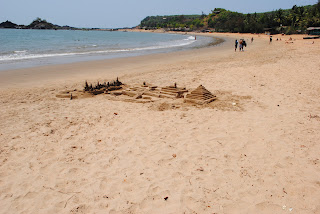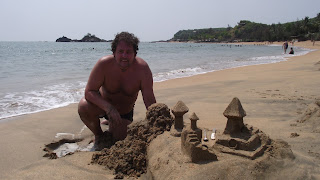Om Beach and Around
Part 8 of our Adventure
Part 8 of our Adventure
Our days are being filled with the
simple passing of time.
Some days we have spent on the hot
sands creating and sculpting things without meaning.
Indian and Europeans faces alike come
to stand and watch. “What is it?”, they eventually ask.
We pause in our work to look across at
what we have made, “I don't know” we answer.
Then we stand and
gaze at our creation with renewed eyes, trying to give reason or
meaning to what we have made.
Inspired by the Champion Sandcastle
Creator that we met in Morjim, knives and spoons have become an
essential part of our sand based activities.
Walls are built around inner sanctums,
arches and tunnels open up into
courtyards,
steps lead up to turrets, curve around
walkways before spiralling down again into the lapping waves or
unused sun bleached sand.
Each section is built as an individual
experiment as we struggle to transform our new ideas into reality.
We now carve overhangs,
cutting curves and straight lines where
only dribble castles or bucketed mounds once stood.
It is only when we stop, interrupted by
a smiling face or the twinge from an over stretched back muscle, do
we actually look at the overall effect of our labours.
Then we too see the city, the
landscape, a place of reality created from sand and wonder “What is
it?”
Eventually each day we are forced to
walk away from our dream worlds, beaten into the sea by the heat of
the day, driven from our labours by the lack of moisture in the
ground or the encroaching sea.
We leave our castles to their rightful
owners. The dogs of Om!
Puppies and dogs roam the beach each
day, staking their claims, marking their territories with barks and
stand offs. They happily adopt the two legged intruders that settle
with their belongings and activities within their patch. Curious at
first and then territorially, the visiting human and his activities
are accepted to become part of their realm. Vast areas of sand are
watched over, possessively guarded, defended against marauding packs
of four footed invaders. Our castles are safe as our Alpha dog
watches and waits.
At other times the Dogs become the
dragons of old battling and playing amongst their own kind, raising
man made towers and walls to the ground, undermining bridges as they
dig for treasure, destroying hours of work with a single paw.
Other days have been spent climbing
over the nearby cliff tops, wandering along narrow tracks with shear
drops to the sea.
On the gentle slope of sand below our
rooms, the waves wash the beach with a grace and calmness that is
almost a caress,
yet 100m around either point, dark and
grey waters crash against the rocks, throwing spray into the air,
leaving pools of salted water to dry into crystallised pockets of
salt.
Powerful waves rush up the sides of
huge sloping slabs, moistening hidden colours to gleam out in the
bright sun light.
We explore, we climb, we wander and we
roam, but always we return to our bay before the sun melts us into
the parched earth.
Some days begin with a welcomed
covering of high cloud allowing for forages further away from home,
others start with brilliant sunlight that blasts heat onto the world
from 8am onwards.
The days are passing and still we find
excused not to leave. Our plan had been to move down the coast to
Udupi, to visit the huge Krsna Temple, to witness more wonderful
sights and sounds but still we remain wrapped in the joy of calmness.
We have managed to ventured out from
our bay to Gokarna, the pilgrimage town that had at first been our
destination.
Shops lined the market avenue filled
with everything a person could desire. An ATM restored our finances.
Book shops supplied us with new journals for the children, a map of
India, pencils and rubbers. Tiny shops with shelves at alarming
angles display fruits of many colours, salads and vegetables, some
recognisable, others to be guessed at as we stared. We found Bread
Fruit, a favourite of mine from my days in Moorea and added it to our
bulging shopping bag.
We bought a Frisbee for the children,
looked at trousers, shirts, skirts and blouses before Peter bought
himself a blanket!
We gazed at the colours piled high in
bowls ready for the Holi celebrations,
while in other tiny stalls beads
overflowed on narrow counters.
Brass pots hung in doorways gleaming in
the sun.
Silver necklaces and Tibetan jewellery
lay side by side as children ran down the street rolling hoops in
front of them.
Sadus and Brahmins wandered past
uniquely dressed hippy's, carrying trays of offerings in one hand and
mobile phones in the other!!
We found a roof top café and retired
from the heat.
Temples abound in Gokarna. Little ones,
big ones, hidden ones, proud ones.
Some are up long flights of steps on
top of hills, others lie down tiny side streets and there are at
least two large ones in the centre of town.
On the day we visited a huge chariot
stood at the end of the market street, decorated brightly after the
recent Shiva celebration, a slightly smaller one by its side.
Enormous wheels dwarfed the passing
crowds, fluttering flags rose up to incredible heights, huge piles of
coiled rope lay in piles on the floor.
In a few days time the top part of the
chariot would be taken apart layer by layer, rope by rope until only
the solid wooden base remained.
This would be pushed into a large
roofed storage room to await its next appearance.
Gokarna is a sacred site, swimming is
not permitted in the sea, sun bathing is also banned.
Those who do enter the water bath
themselves in a specific ritual to remove past sins before they enter
one of the beautiful temples to receive their blessing.
The town is filled with the aroma of
incense, flowers and coconuts are sold on street corners by smiling
women, while men laden down with chanting beads stand in front of
stalls selling ghee lamps and offering bowls.
Yet there is another side to Gokarna.
Not that long ago one bought bread and food wrapped in old newspaper
(like our fish and chips of old) chai was served in clay pots, water
was drawn from the well, shopping items were handed over to be
wrapped in a shawl, blanket, basket and carried home balanced on ones
the head. Each evening the leaves, papers, cardboard not eaten by the
cows were gathered up and burnt, the smoke driving the mosquitoes
away, the resulting ash joining the dust of the street.
Tourists, as opposed to pilgrims,
Indian and Europeans, discovered Gokarna after Goa became too busy.
They come, attracted by the cheep accommodation and food, the peace
and spirituality. But with the crowds comes the demands of tourism.
Plastic now lines the narrow river that
runs into the sea, rubbish and empty bags spill out onto the beach.
Cows who once ate 99% of everything thrown away now choke on the
plastic bags, their stomachs distended by the none digestible rubbish
they have swallowed.
Water is becoming scarce as flush loos are not
only requested but expected en-suite. The pig loo at the bottom of a
plot is becoming a thing of the past. (I have some quite diverse
memories of the pig loos in Arambol when I first came!) Sewerage and
waste now flows into the waterways that wind their way to the beach.
From a distance the world looks green
and blue but up close there is the reek of decay. Peoples homes and
shops are kept as clean as the dust will allow but the streets are
filling with plastic bottles. Piles of rotting plastic gathers behind
restaurants, broken plastic chairs, twisted and crushed buckets,
broken brushes, abandoned belongings all join together in piles that
never grow smaller.
We returned to the peace of Om Beach
with our news paper paper wrapped samosas and our shopping in one of
our cloth bags.
We stopped briefly to fill the rickshaw
with fuel poured from a plastic bottle kept under the seat and
thought again about the number of plastic bottles of water we consume
each day and pondered where the county was heading.












































No comments:
Post a Comment